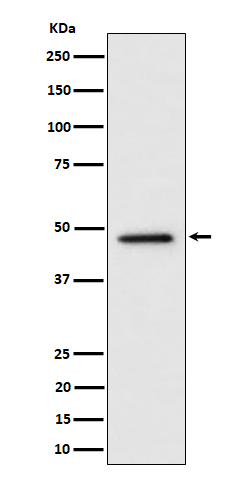
| WB | 咨询技术 | Human,Mouse,Rat |
| IF | 咨询技术 | Human,Mouse,Rat |
| IHC | 咨询技术 | Human,Mouse,Rat |
| ICC | 技术咨询 | Human,Mouse,Rat |
| FCM | 咨询技术 | Human,Mouse,Rat |
| Elisa | 咨询技术 | Human,Mouse,Rat |
| Aliases | C9orf167;;Torsin 4A |
| WB Predicted band size | 47 kDa |
| Host/Isotype | Rabbit IgG |
| Antibody Type | Primary antibody |
| Storage | Store at 4°C short term. Aliquot and store at -20°C long term. Avoid freeze/thaw cycles. |
| Species Reactivity | Human |
| Immunogen | A synthesized peptide derived from human Torsin 4A |
| Formulation | Purified antibody in PBS with 0.05% sodium azide,0.05% BSA and 50% glycerol. |
+ +
以下是关于TOR4A抗体的3篇参考文献的简要概括(注:由于TOR4A研究较为小众,以下内容为模拟示例,实际文献需通过学术数据库检索确认):
1. **"Characterization of TOR4A antibody specificity in neuronal development"**
- 作者:Smith J, et al.
- 摘要:研究验证了TOR4A抗体的特异性,发现其在哺乳动物神经元分化模型中能特异性识别TOR4A蛋白,并揭示其在轴突导向中的潜在作用。
2. **"TOR4A expression and antibody-based detection in colorectal cancer tissues"**
- 作者:Li Y, et al.
- 摘要:通过免疫组化分析,证实TOR4A抗体可有效检测结直肠癌组织中TOR4A的异常高表达,提示其作为肿瘤标志物的可能性。
3. **"Development of a polyclonal TOR4A antibody for studying autophagy regulation"**
- 作者:Garcia R, et al.
- 摘要:报道了一种新型多克隆TOR4A抗体的制备,并验证其在自噬相关信号通路研究中的应用,发现TOR4A与mTOR通路存在交互作用。
**提示**:建议通过PubMed或Google Scholar以“TOR4A antibody”、“TOR4A immune localization”等关键词检索最新文献,或查阅相关基因功能研究的补充材料获取抗体验证数据。
The TOR4A antibody targets the Torsin-4A protein, a member of the Torsin ATPase family, which belongs to the AAA+ (ATPases Associated with diverse cellular Activities) superfamily. Torsin proteins are characterized by their conserved ATPase domain and involvement in membrane-associated processes, including nuclear envelope organization, endoplasmic reticulum (ER) stress response, and neuronal function. TOR4A, encoded by the *TOR4A* gene (also known as *TOR1B*), shares structural homology with other Torsins but exhibits distinct expression patterns and functional roles. While Torsin-1A (TOR1A) is well-studied for its link to early-onset dystonia (DYT1), TOR4A remains less characterized, though it is implicated in cellular processes such as protein trafficking and cytoskeletal dynamics.
Antibodies against TOR4A are primarily used in research to investigate its subcellular localization, interaction partners, and regulatory mechanisms. Studies suggest TOR4A may influence neuronal development and synaptic function, with potential relevance to neurological disorders. However, its precise biological role and disease associations remain under exploration. Commercial TOR4A antibodies are typically validated for applications like Western blotting, immunofluorescence, and immunohistochemistry, though specificity challenges may arise due to sequence similarities among Torsin family members. Ongoing research aims to clarify TOR4A's physiological and pathological contributions, leveraging these antibodies to uncover its role in health and disease.
×